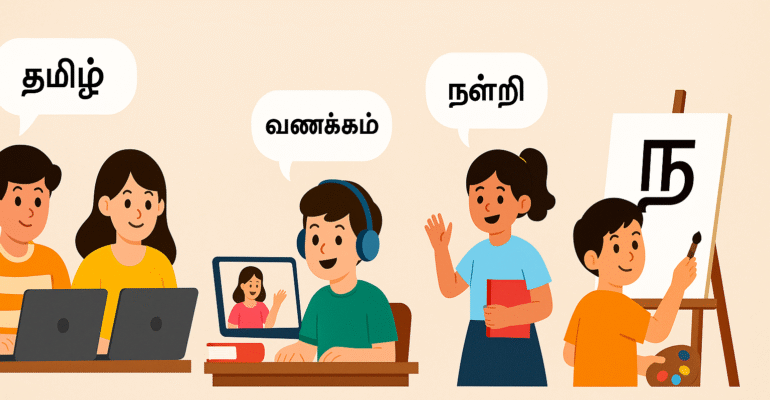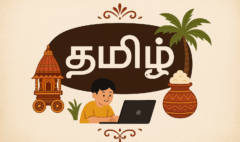How to Talk About Your School and Education in Tamil
How to Talk About Your School and Education in Tamil
How to Talk About Your School and Education in Tamil
For a child, school is their entire world—a place of learning, friendship, and growth. For a parent, it’s a topic of daily conversation, from “How was your day?” to “Did you finish your homework?” Being able to navigate these conversations in Tamil is a powerful way to reinforce the language, strengthen family bonds, and actively participate in your child’s life. This guide is designed to provide you with all the essential education vocabulary and phrases you need to talk about school and studies with clarity and confidence. Whether you’re a parent helping your child with homework or a student yourself, this guide will provide you with the tools to master the art of talking about studies in Tamil.
We will cover everything from the basic words for a school in Tamil to key `academic phrases` that are used in daily conversations. By integrating these phrases into your routine, you are making Tamil a living, breathing part of your child’s educational journey, and that is a gift that will last a lifetime.
The Value of Education Vocabulary
A parent’s involvement in their child’s education is one of the biggest predictors of success. Being able to talk about school in Tamil allows you to connect with teachers, understand your child’s assignments, and help them with their studies. For a child, it reinforces the idea that their mother tongue is a language of learning, not just of home. It provides them with the confidence to use Tamil in a more formal, academic setting and to feel a sense of pride in their bilingual abilities. Mastering this `education vocabulary` is a crucial step in a child’s overall linguistic development.
A Glossary of School in Tamil
Let’s start with the basics. Here are the key words you need to talk about the school environment and the people within it.
School Personnel
- ஆசிரியர் (Aasiriyar): Teacher (Male)
- ஆசிரியை (Aasiriyai): Teacher (Female)
- மாணவர் (Manavar): Student (Male)
- மாணவி (Manavi): Student (Female)
- தலைமை ஆசிரியர் (Thalaimai Aasiriyar): Principal
School Subjects
- தமிழ் (Tamil): Tamil
- கணிதம் (Ganitham): Mathematics
- அறிவியல் (Ariviyal): Science
- சமூக அறிவியல் (Samuga Ariviyal): Social Science
- ஆங்கிலம் (Aangilam): English
- வரலாறு (Varalaru): History
- புவியியல் (Puviyiyal): Geography
Learning these words is a great way for a child to start talking about their favorite subjects and to connect with you about what they are learning in class. It also helps them to identify the subjects when they see the words written down. This list provides a good foundation for talking about a school in Tamil.
Classroom Items
- புத்தகம் (Puththagam): Book
- பேனா (Pena): Pen
- பென்சில் (Pencil): Pencil
- அழிப்பான் (Azhippa): Eraser
- பலகை (Palakai): Board
- மேசை (Mesai): Table
- நாற்காலி (Naarkali): Chair
Key Phrases for Talking About Studies
Words are just the beginning. The real value is in putting them together into phrases that you can use in daily conversations. Here are some essential phrases for talking about studies with your child.
- “இன்று பள்ளி எப்படி இருந்தது?” (Indru palli eppadi irundadhu?): How was school today?
- “உன் வீட்டுப் பாடம் முடித்தாயா?” (Un veettu paadam mudiththayaa?): Did you finish your homework?
- “உன் தேர்வு எப்படி இருந்தது?” (Un thervu eppadi irundadhu?): How was your exam?
- “நான் கணக்குப் படிக்கிறேன்.” (Naan ganitham padikkiren.): I am studying math.
- “இந்த பாடம் எனக்கு புரியவில்லை.” (Intha paadam enakku puriyavillai.): I don’t understand this lesson.
- “உனக்கு என்ன பாடம் பிடிக்கும்?” (Unakku enna paadam pidikkum?): What is your favorite subject?
Advanced Academic Phrases
For more formal conversations or for students who are at a higher level, these phrases can be very useful. They can be used to ask questions, explain concepts, and communicate with teachers. These are key academic phrases that are a part of a more formal conversation.
- “ஆசிரியர் என்ன சொன்னார்?” (Aasiriyar enna sonnaar?): What did the teacher say?
- “நான் ஒரு கேள்வி கேட்கலாமா?” (Naan oru kelvi ketkalam?): Can I ask a question?
- “இந்த தலைப்பு பற்றி எனக்கு ஒரு சந்தேகம் இருக்கிறது.” (Intha thalaippu patri enakku oru sandegam irukkirathu.): I have a doubt about this topic.
- “பள்ளியின் கால அட்டவணை என்ன?” (Palliyin kaala attavanai enna?): What is the school’s schedule?
The Parent-Tutor-Child Connection
For parents who may not be fluent in Tamil, navigating these conversations can be a challenge. This is where an online tutor can be a game-changer. At Powerkid Tamil, our expert tutors can help you and your child master this education vocabulary and practice using it in context. Our one-on-one lessons can be a bridge between a parent’s desire to help and a child’s need for a supportive `bilingual home` environment. We can help you learn the correct pronunciation of `academic phrases` and build the confidence to engage in meaningful conversations about your child’s education.
Conclusion
Learning how to talk about your school and education in Tamil is a powerful way to make the language a part of your daily life. It is a way to connect with your child’s world, support their learning, and pass on a priceless cultural heritage. By using these phrases and words, you are showing your child that Tamil is a language of knowledge and opportunity. You are making their educational journey a truly bilingual one.
We invite you to partner with Powerkid Tamil and give your child the gift of a truly comprehensive education. Our expert tutors and personalized curriculum are designed to help your child thrive. Start your first lesson today and master the art of talking about studies with confidence!











